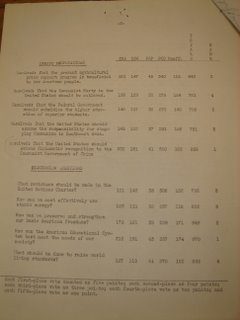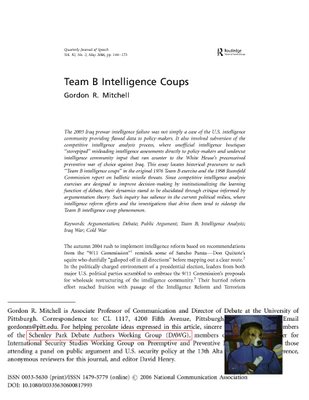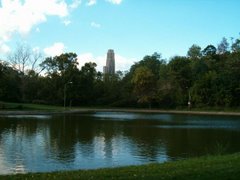I have spent the day in a historical newspaper archive following the bruhaha in 1954. Here are some choice selections:
DEBATE TOPIC DISPUTEDNew York Times (1857-Current file); Oct 23, 1954; ProQuest Historical Newspapers The New York Times (1851 - 2003)
pg. 10
The refusal of four Nebraska state-supported teachers colleges to allow students to debate recognition of the Communist China Government touched off widespread discussion among educators today.
The colleges at Kearney, Wayne, Peru and Chardon, agreed not to allow students to take part in an intercollegiate discussion of the question, E. Albin Larson, secretary of the State Normal Board said. The subjest was selected by the Speech Association of America, to shich the colleges belong.
Herbert L. Cushing, Kearney president, said that he was opposed to having debaters ‘spend half their time to argue the Communist side.’ Someone ‘is trying to indoctrinate a few thousand American college youths with dangerous philosophy,’ he added.
West Point and Annapolis Forbid Debates on Recognition of PeipingBy ELIE ABELSpecial to The New York Times.
New York Times (1857-Current file); Nov 16, 1954; ProQuest Historical Newspapers The New York Times (1851 - 2003)
pg. 1
The United States Military Academy at West Point and the Naval Academy at Annapolis have forbidden participation by cadets or midshipmen in college debates on whether the United States should recognize Communist China.
[…]
Confirming the existence of an Academy ban on debates of the China question the Army said:
‘It is Department of the Army policy not to have U.S.M.A. cadets involved in a debate on such a controversial subject, on which in any event national policy has already been established.’
West Point’s most prominent living graduate, President Eisenhower, enunciated a different philosophy at his news conference last Wednesday, when he was asked to comment on the ‘anti-intellectual trend in our country which expresses itself in hostility to new ideas or different ideas or even traditional ideas.’
The President’s reply was that the United States system could stand on its own feet and would be upheld by the people in the face of an open and exhaustive discussion.
Although he would not tolerate anyone’s preaching the destruction of the United States form of government by violence, the President said, everyone should eb free to talk a philosophy of life, an economic, social or governmental doctrine.
When a people became so frightened of new ideas that it could not tolerate discussion of them, that people was confessing to a fear of itself, he asserted.
Television in ReviewBy JACK GOULD
New York Times (1857-Current file); Nov 26, 1954; ProQuest Historical Newspapers The New York Times (1851 - 2003)
pg. 39
Once again, 'See It Now' has performed a notable service in the cause of free speech and civil liberties. On Tuesday evening over the C.B.S. television network Edward R. Murrow reported on the controversy over whether colleges shoudl debate the question of recognizing Communist China. The program was illuminating and responsible reporting and an effective protest against the creeping plague of intellectual conformity and timidity. It said what needed to be said.
“An assistant Professor of Speech at Duke University made public a letter written by representative Edward J. Robeson Jr., a democrat of Virginia, who cautioned a Duke student against taking the affirmative side in the debate. The Representative wanted to know the student’s home address and the name of the faculty member who had responsibility for the Duke debating team.”
“Perhaps the most useful segment of “See It Now” was its pick-up of a debate between the teams of Princeton and Temple Universities. Two Princeton boys, assifned to argue the affirmative of whether to recognize China, were the winners. Then, the debate over, they explained they were personally against recognition. The Temple team explained it had argued both sides.
In their simple, direct definition of the meaning of debate, the college students delivered their own trenchant editorial in support of the democratic precept that to know one’s argument is right one must know an opponent’s viewpoint.”
“See It Now” closed with brief remarks by Tom Waddell, president of the Dartmouth Forensic Union, who reported that Dartmouth had declined Navy’s invitation to debate an alternate topic. Dartmouth did not believe, said Mr. Waddell, that cadets and midshipmen were second-class citizens without the same freedom of speech as civilian students. He suggested that the Navy debate, on either side, the right to debate.
By coincidence, President Eisenhower had said at his Tuesday press conference that he would have allowed Annapolis and West Point to participate in the debate on recognizing Red China. “See It Now” reported this development but not so emphatically as it should have.
Even so, the larger lesson taught by “See It Now” remained. To try to avoid controversy is only to invite more of it and the right of free debate must be kept inviolate. Mr. Murrow suggested with a smile it might be fun to see on a television a debate between the ultimate winners in a national collegiate debating contest and a couple of Congressmen. It would indeed”




